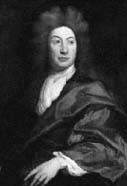John Dryden was the leading playwright, literary critic and poet of his era, which became known as ‘the Age of Dryden.’ Dryden was born in Northamptonshire, England in 1631, the son of a country gentleman and studied at Trinity College, Cambridge. When Charles II was restored in 1660, he wrote poems in honour of the new monarch. In 1668, he became poet laureate and later royal historiographer. Charles II reopened the theatres that had been closed by the Puritans during the parliamentary rule. Dryden began writing plays for the revived English theatre, with increasing success, as well as the first essays in dramatic criticism. In 1681, he turned to writing satires (Absalom and Achitophel and The Medall for instance) in support of the king with regard to issues he had with parliament over his successor. With the accession of the Catholic King James II, Dryden converted to Catholicism.  After a few failures on the stage, he ceased working as a playwright and instead translated Latin poetry and wrote commissioned pieces, becoming known as a man of letters, frequently seen at fashionable coffee shops. He died in 1700 with a legacy of almost 30 tragedies, comedies, and dramatic operas.
After a few failures on the stage, he ceased working as a playwright and instead translated Latin poetry and wrote commissioned pieces, becoming known as a man of letters, frequently seen at fashionable coffee shops. He died in 1700 with a legacy of almost 30 tragedies, comedies, and dramatic operas.
Dryden’s work is characterised by self-assurance and confidence. His first important poetic composition was the Heroic Stanzas (1659) in commemoration of the death of Oliver Cromwell. They are serious, considered and mature works with numerous classical and scientific allusions. The following year he wrote another poem "Astraea Redux" to celebrate Charles II’s restoration and "To His Sacred Majesty" for the coronation, both calculated to endow the king with qualities of splendour, solidity and divinity. His Annus Mirabilis (1667) celebrates English naval victories over the Dutch and Charles II and his people’s endurance of the Great Fire of London of 1666.
Dryden’s first theatrical success was a heroic tragedy The Indian Queen (1664) and was followed by works such as Tyrannick Love (1669), The Conquest of Granada by the Spaniards (1670) and Aureng-Zebe (1675) as well as reworking of plays by Molière and Shakespeare. These heroic dramas were lavishly staged and noisy, featuring conflicts between love and honour, and brash heroes in worshipful surrender to charming heroines. When the heroic plays fell out of fashion, he wrote sophisticated comedies of intrigue and sparklingly witty repartee, such as Marriage A-la-Mode (1672.) With plays such as Don Sebastian (1689) and Amphitryon (1690) he moved into a Neoclassical period of elegant and intellectual writing with action portrayed as a natural development of character. He also wrote libretti for the newly introduced opera genre (for example King Arthur in 1691 with Henry Purcell.) Dryden explored the general principles of theatrical criticism in his Of Dramatick Poesie, an Essay (1668) which supports English drama against ancient Classical drama and the Neoclassical French theatre and is the first significant example of modern dramatic analysis. Dryden's method was characteristically investigative and objective. His satirical work included Mac Flecknoe a devastating attack on the playwright Thomas Shadwell, which forever destroyed the man’s reputation.